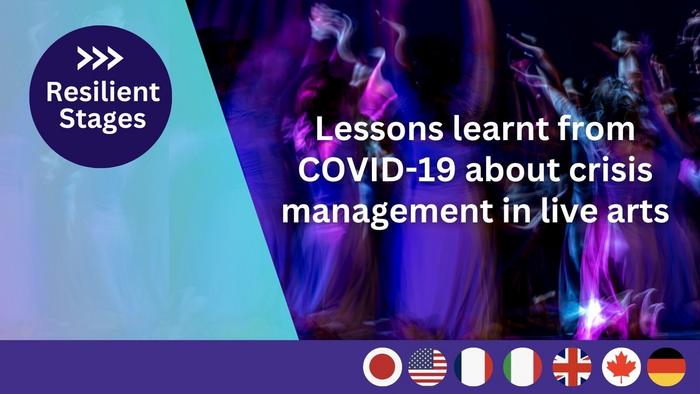FRANKFURT. The British Academy-funded research project “Pandemic Preparedness in the Live Performing Arts: Lessons to learn from Covid-19 across the G7” ran from April 2023 to January 2024. Its aim: To compare how government and non-government funding has affected the work of institutions, organizations, performing artists and freelancers in the G7 countries during the pandemic, focusing in particular on a comparison between the USA, Canada, the UK and Germany. The co-investigator of the project’s German team was Prof. Heidi Liedke from Goethe University’s Institute of English and American Studies (IEAS), with Ronja Koch acting as its research associate. One of Liedke’s research areas is digital forms of contemporary theater and the pandemic’s impact on theater in the UK and Germany.

Credit: University of Exeter
FRANKFURT. The British Academy-funded research project “Pandemic Preparedness in the Live Performing Arts: Lessons to learn from Covid-19 across the G7” ran from April 2023 to January 2024. Its aim: To compare how government and non-government funding has affected the work of institutions, organizations, performing artists and freelancers in the G7 countries during the pandemic, focusing in particular on a comparison between the USA, Canada, the UK and Germany. The co-investigator of the project’s German team was Prof. Heidi Liedke from Goethe University’s Institute of English and American Studies (IEAS), with Ronja Koch acting as its research associate. One of Liedke’s research areas is digital forms of contemporary theater and the pandemic’s impact on theater in the UK and Germany.
As part of the project, the research teams conducted extensive literature syntheses of publications from 2020-2023, looking at both academic and journalistic publications as well as policy papers relating to theater, opera and dance. Liedke also spoke with representatives of several state theaters, the German federal government’s department of theater, dance and performance, as well as Deutscher Bühnenverein [German Stage Association], among others.
The €2 billion “Neustart Kultur” funding program is the first of its kind providing an unprecedented amount of funding to culture in Germany – at a scale that is also unique by international standards. The program provided many people with financial security, albeit not to the same extent: while permanent employees of municipal and state theaters received short-time work benefits, independent and self-employed artists struggled with numerous applications for financial support. That being said, project funding was available at the federal and, above all, the state level, and could be obtained both quickly and unbureaucratically. It was particularly important that performances involving a physical gathering of people no longer constituted a prerequisite for funding – offering freedom and space to further develop one’s own art. Many artists were appreciative of the fact that politicians spoke of the importance of culture and its promotion to Germany; they felt seen.
The pandemic and the associated social distancing regulations led to a lot of experimentation with digital formats. However, many institutions lacked a comprehensive digital strategy – both in terms of artistic practice as well as with regard to their internal structures. This is particularly true of rural areas, where internet access remains a problem. There did, however exist a certain funding focus on rural areas, allowing new performative formats to emerge while at the same time promoting digitalization. Generally speaking, public spaces were increasingly included, with theaters such as Frankfurt’s Mousonturm artists’ house, for instance, building a special open-air stage.
“Artists and theaters in Germany and Canada received significantly more support than those in other countries,” Prof. Liedke says. The state of Hesse’s “Masterplan Kultur” [master plan for culture] and the resilience managers employed by some state theaters (e.g. in Hanover or Darmstadt) constituted best practice examples at a joint conference, attended by a politician from the House of Lords, amongst others. The debate on whether to include arts funding in the German constitution also met with great interest. “This is precisely what artists in the UK themselves are discussing and want to take to the political arena,” she adds.
All of this notwithstanding, Liedke points out that the German system also has its weaknesses: compared to other countries, German theaters still need to become considerably more accessible – both for employees as well as for audiences. In addition, minorities need to be given greater consideration. Beyond that, there is also room for improvement in terms of funding strategy and co-determination. Bureaucratic hurdles and the lack of coordination between the various funding offers have made it particularly difficult for freelancers to access funds. It would make sense for various cultural and political actors to be involved in the development process, as was the case with Hesse’s “Masterplan Kultur”, for example. The five recommendations for action for political decision-makers in the UK are available on the project’s homepage.



